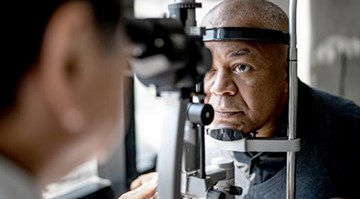If you wear glasses or have contacts, you’re probably familiar with the glaucoma test that shoots a puff of air into your eye before an eye exam. While it’s not the most pleasant part of the visit, it is one of the more important parts.
According to the National Eye Institute (NEI), glaucoma is a family of eye diseases that affects your optic nerve and can cause damage to your vision. Detection and early treatment are key in dealing with glaucoma since most symptoms emerge later in life.
Here are five things you should know about glaucoma:
1. The Basics
The most common type of glaucoma in the U.S. is open-angle glaucoma. However, there are other types like angle-closure and congenital glaucoma. Glaucoma symptoms tend to emerge as you age. So a comprehensive dilated eye exam is the only way to tell if you have it.
2. Symptoms
Because glaucoma symptoms are typically delayed, about half of people with glaucoma don't know they have it. According to the NEI, people with glaucoma may slowly lose their vision over time. This delay, combined with the loss of peripheral vision first, means that most people don't notice the change in their vision. Without treatment, glaucoma can lead to serious vision loss and blindness.
3. Risk Factors and Causes
Glaucoma isn’t preventable, and there are no known causes. Many people with glaucoma also have high eye pressure. So treating that can slow the disease’s progression. Those who are at a higher risk of having glaucoma include African Americans over 40, Hispanic or Latino people over 60, and anyone with a family history of glaucoma.
4. Testing and Detection
People with a higher risk of glaucoma should have a comprehensive dilated eye exam every one to two years. Your doctor will use drops to widen your pupil and check for glaucoma and other problems using simple tests. This normally includes a visual field test that checks your peripheral vision.
5. Treatment
If you’re diagnosed with glaucoma, it’s important to start treatment immediately. Medicines, laser treatment and surgery are the three most common ways to treat glaucoma. The most common form of treatment is prescription eye drops to lower the pressure in your eye and prevent further optic nerve damage. Doctors also use laser treatment to relieve pressure by draining the fluid from your eye. If eye drops and laser treatment don’t work, you may need surgery to fight glaucoma.
Visit the NEI’s website for more information and resources and be sure to get your annual eye exam, especially if you wear glasses or contacts or are in one of the higher risk groups.
QualChoice Vision Benefits
Did you know QualChoice offers vision benefits? As part of our commitment to simplifying health insurance and improving the health of Arkansas, we partnered with Superior Vision from VersantHealth to provide vision coverage for employer groups. Superior Vision is a premier national vision plan and a leader in the managed vision care market since 1993. Superior Vision's value-added benefits, affordable eye care services and excellent customer service is a natural fit with the quality plans from QualChoice.






